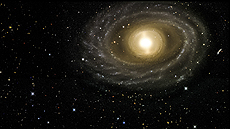Dark Energy Survey kicks off second season cataloging the wonders of deep space
 |
| This image of the NGC 1398 galaxy was taken with the Dark Energy Camera. This galaxy lives in the Fornax cluster, roughly 65 million light-years from Earth. Photo: Dark Energy Survey
|
On Aug. 15, with its successful first season behind it, the Dark Energy Survey (DES) collaboration began its second year of mapping the southern sky in unprecedented detail. Using the Dark Energy Camera, a 570-megapixel imaging device built by the collaboration and mounted on the Victor M. Blanco Telescope in Chile, the survey's five-year mission is to unravel the fundamental mystery of dark energy and its impact on our universe.
Along the way, the survey will take some of the most breathtaking pictures of the cosmos ever captured. The survey team has announced two ways the public can see the images from the first year.
Today, the Dark Energy Survey relaunched Dark Energy Detectives, its successful photo blog. Once every two weeks during the survey's second season, a new image or video will be posted to www.darkenergydetectives.org, with an explanation provided by a scientist. During its first year, Dark Energy Detectives drew thousands of readers and followers, including more than 46,000 followers on its Tumblr site.
Starting on Sept. 1, the one-year anniversary of the start of the survey, the data collected by DES in its first season will become freely available to researchers worldwide. The data will be hosted by the National Optical Astronomy Observatory. The Blanco Telescope is hosted at the National Science Foundation's Cerro Tololo Inter-American Observatory, the southern branch of NOAO.
In addition, the hundreds of thousands of individual images of the sky taken during the first season are being analyzed by thousands of computers at the National Center for Supercomputing Applications at the University of Illinois at Urbana-Champaign, Fermi National Accelerator Laboratory (Fermilab), and Lawrence Berkeley National Laboratory. The processed data will also be released in coming months.
Scientists on the survey will use these images to unravel the secrets of dark energy, the mysterious substance that makes up 70 percent of the mass and energy of the universe. Scientists have theorized that dark energy works in opposition to gravity and is responsible for the accelerating expansion of the universe.
"The first season was a resounding success, and we've already captured reams of data that will improve our understanding of the cosmos," said DES Director Josh Frieman of the U.S. Department of Energy's Fermi National Accelerator Laboratory and the University of Chicago. "We're very excited to get the second season under way and continue to probe the mystery of dark energy."
Read more
|